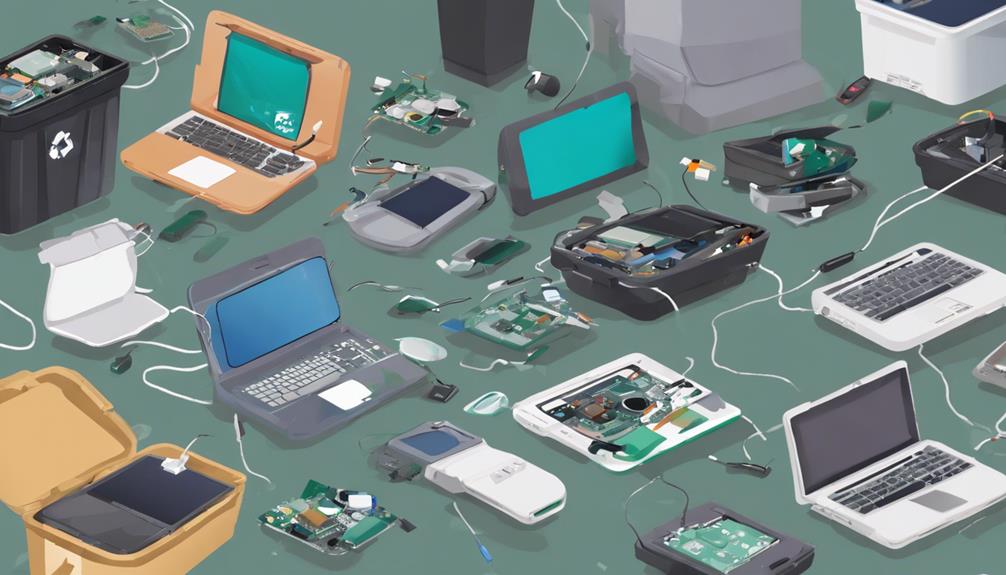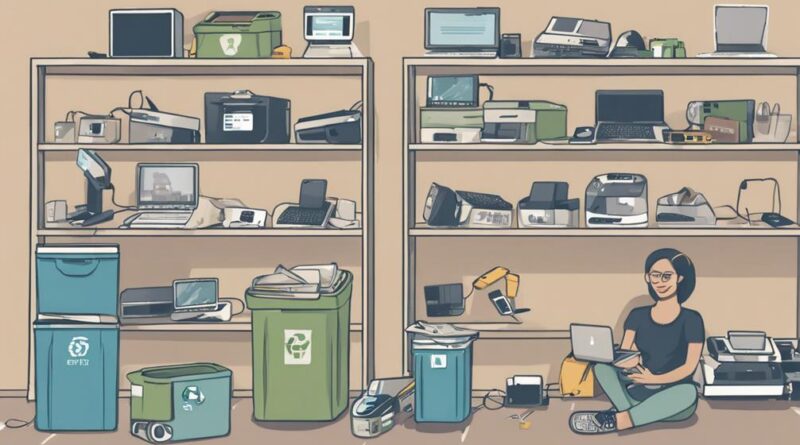Top Strategies for Home Electronic Recycling
This post may contain affiliate links which means I may receive a commission for purchases made through links. As an Amazon Associate, I earn from qualifying purchases. Learn more on my Private Policy page.
To effectively recycle electronics at home, start by clearing data and disassembling devices. Ensure cleaning and reset for data security. Look for certified e-waste recyclers with R2 or e-Stewards accreditation. Wipe data thoroughly and use encryption software for cybersecurity. Donating electronics to charity can benefit both the environment and others. Options for non-functioning electronics include local centers and manufacturer programs. Eco-friendly disposal practices include refurbishing and recycling through certified facilities. These top strategies optimize electronic recycling impact and resource use.
Importance of Electronic Recycling
Understanding the environmental impact of electronic waste is crucial in highlighting the importance of electronic recycling. Electronic waste, also known as e-waste, is a growing concern globally due to its harmful effects on the environment. Improper disposal of electronics leads to toxic chemicals leaching into the soil and water, contributing to pollution and posing health risks to humans and wildlife. Sustainable practices in electronic recycling are essential to mitigate these negative impacts.
Recycling electronics helps in reducing the amount of e-waste that ends up in landfills or incinerators. Through recycling, valuable materials like metals, plastics, and glass can be recovered and reused in the manufacturing of new products. This not only conserves natural resources but also reduces energy consumption and greenhouse gas emissions associated with extracting and processing raw materials.
Types of Electronics to Recycle
To effectively contribute to reducing electronic waste and its environmental impact, it's important to understand which types of electronics can be recycled. E-waste impact is significant due to the hazardous materials often found in electronic devices like lead, mercury, and cadmium. Recycling these electronics can help mitigate the environmental harm caused by improper disposal and reduce the need for raw materials used in manufacturing new products.
Common types of electronics that can be recycled include old computers, laptops, printers, mobile phones, televisions, and small kitchen appliances. These devices contain valuable materials such as gold, silver, copper, and plastics that can be extracted and reused in the production of new electronics. By recycling these items, you not only prevent them from ending up in landfills but also contribute to conserving natural resources and reducing energy consumption.
The benefits of recycling electronics are manifold. Firstly, it prevents toxic substances from contaminating the soil and water sources, safeguarding human health and the environment. Secondly, it reduces the energy required to mine and process raw materials, lowering greenhouse gas emissions. Lastly, recycling electronics helps create a circular economy where materials are reused, thereby promoting sustainability and resource efficiency. By responsibly recycling your electronics, you play a vital role in protecting the planet for future generations.
How to Prepare Electronics for Recycling
Preparing electronics for recycling requires thorough cleaning to remove any personal data and accessories before dropping them off at a designated recycling center. To start, consider disassembly techniques to break down larger electronics into manageable parts. This can involve removing screws, separating components, and dismantling the device following manufacturer guidelines. Disassembling electronics not only facilitates recycling but also ensures that individual parts are properly sorted for appropriate recycling processes.
Next, focus on the cleaning process. Use a soft, dry cloth to wipe down the exterior of the electronic device, removing any dust, dirt, or debris. For more stubborn grime, lightly dampen the cloth with a small amount of water or electronic-friendly cleaning solution. Avoid using harsh chemicals that could damage the device or harm the environment during disposal. Pay special attention to ports, vents, and crevices where dust tends to accumulate.
Furthermore, safeguard your personal data by performing a factory reset or data wipe on electronic devices like smartphones, laptops, and tablets. This process ensures that your information isn't accessible to others after recycling. Remember to remove any SIM cards, memory cards, or external storage devices before recycling to protect your data completely.
Finding a Certified E-Waste Recycler
When looking for a certified e-waste recycler, prioritize verifying their accreditation and compliance with industry standards for responsible electronic recycling. Choosing a certified recycler ensures that your electronic devices are handled and disposed of properly, minimizing environmental impact and potential data security risks. Certification from organizations like R2 (Responsible Recycling) and e-Stewards signifies that the recycler follows best practices in e-waste management.
To find a certified recycler, start by checking their website for certification logos and accreditations. Look for detailed information on their processes for collecting, dismantling, recycling, and disposing of electronic waste. Additionally, consider asking for proof of certifications and compliance with local regulations when contacting the recycler.
Responsible disposal of electronic waste is crucial to prevent environmental pollution and health hazards. Certified recyclers ensure that hazardous materials present in electronic devices are handled safely and in an environmentally friendly manner. By choosing a certified recycler for your e-waste, you contribute to sustainable practices and support the proper management of electronic waste streams. Make an informed decision when selecting a recycler to ensure that your old electronics are recycled responsibly.
Data Security Measures Before Recycling
Implementing robust data security measures before recycling your electronic devices is imperative to safeguard sensitive information and prevent potential data breaches. One of the key steps to take in this process is data wiping. Data wiping involves permanently deleting all data from your devices to ensure that no sensitive information remains accessible to unauthorized individuals. This process goes beyond simply deleting files, as data can still be recoverable if not properly wiped. Utilizing specialized software designed for data wiping can help ensure a thorough removal of all data from your electronic devices.
In addition to data wiping, it's essential to take cybersecurity precautions before recycling your electronics. This includes encrypting your data, enabling firewalls, and using up-to-date antivirus software to protect against cyber threats. Encrypting your data adds an extra layer of security by converting information into a code that can only be accessed with the correct encryption key. Firewalls act as a barrier between your device and potential cyber attacks, while antivirus software helps detect and remove malicious software that could compromise your data.
Donating Electronics to Charity
To maximize the impact of your electronic recycling efforts, consider donating your electronics to charity organizations that accept such donations. Charity partnerships can provide a meaningful way to dispose of your old electronics while benefiting those in need. By choosing to donate your electronics, you can ensure that they're put to good use rather than ending up in a landfill.
Impactful donations of electronics to charities can have several benefits. First, it allows you to declutter your home while contributing to a good cause. Many charity organizations refurbish donated electronics for reuse or recycle them responsibly, reducing electronic waste and its environmental impact. Additionally, donating electronics can help bridge the digital divide by providing access to technology for underserved communities.
When selecting a charity to donate your electronics to, consider organizations that have established programs for accepting such donations. Look for charities that have partnerships with recycling centers or refurbishers to ensure that your electronics are handled responsibly. Some charities even provide donation receipts, which can be useful for tax purposes.
Recycling Options for Non-Functioning Electronics

Consider exploring local electronic recycling centers or drop-off locations for environmentally responsible disposal of your non-functioning electronics. When it comes to e-waste disposal, it's crucial to opt for sustainable recycling methods to prevent harm to the environment. Here are some options for responsibly disposing of your non-functioning electronics:
- Local Recycling Centers: Many communities have designated electronic recycling centers or events where you can drop off your non-functioning devices for proper disposal.
- Retailer Take-Back Programs: Some electronics retailers offer take-back programs where they accept old electronics for recycling, often regardless of where the product was originally purchased.
- Manufacturer Recycling Programs: Several electronic manufacturers have their recycling initiatives, allowing you to return products for responsible disposal or refurbishment.
- Municipal E-Waste Collections: Check with your local municipality for e-waste collection days or permanent drop-off locations to recycle old electronics.
- Certified E-Waste Recyclers: Look for certified e-waste recyclers in your area who follow environmentally friendly practices to ensure your electronics are recycled responsibly.
Eco-Friendly Disposal of Electronics
For environmentally conscious individuals, adopting eco-friendly practices when disposing of electronics is crucial to minimizing the impact of e-waste on the environment. Sustainable disposal of electronics involves utilizing green technology and responsible methods to ensure that electronic devices are recycled or disposed of in an environmentally friendly way.
One effective strategy for eco-friendly disposal of electronics is to donate working devices to organizations that refurbish and redistribute them to those in need. This not only extends the life of the electronics but also reduces the demand for new products, thereby decreasing the environmental impact of electronic manufacturing.
Another sustainable disposal option is to recycle electronics through certified e-waste recycling facilities. These facilities use advanced green technology to safely dismantle electronic devices, recover valuable materials, and dispose of hazardous components in an environmentally responsible manner. By recycling electronics, valuable resources such as metals and plastics can be recovered and reused in the manufacturing of new products, reducing the need for virgin materials and lowering energy consumption.
Frequently Asked Questions
Can All Types of Electronics Be Recycled at Home?
Yes, not all types of electronics can be recycled at home due to recycling limitations. Some items like old computers, printers, and cell phones are commonly accepted for home recycling.
However, certain electronics with hazardous components or large appliances may require specialized facilities for recycling. To ensure proper disposal, research local home recycling options or take these items to designated drop-off locations for safe handling.
Is It Necessary to Remove Batteries Before Recycling?
When recycling electronics at home, it's crucial to remove batteries before disposal. This step is essential for battery disposal and reducing the environmental impact of improper battery recycling.
Batteries contain harmful chemicals that can leach into the environment if not handled correctly. Proper battery recycling procedures ensure that these toxic substances are dealt with responsibly and don't harm the ecosystem.
What Should I Do With Electronic Accessories?
When it comes to electronic accessories, you have a couple of eco-friendly options. Consider donating them to organizations that accept such items for reuse or repurposing. This not only helps the environment but also benefits those in need.
Additionally, you can explore various upcycling projects where old accessories can be transformed into new and useful items. By choosing these paths, you contribute to sustainability and reduce electronic waste.
Are There Any Consequences of Not Recycling Electronics?
If you don't recycle electronics, there can be serious consequences. Environmental impact is significant, as e-waste contains hazardous materials that can pollute soil and waterways.
Additionally, not following e-waste regulations can lead to fines and penalties. By properly recycling your electronics, you help reduce pollution and ensure compliance with laws aimed at protecting the environment.
Proper disposal is key to minimizing these negative effects.
How Can I Ensure My Data Is Completely Erased Before Recycling?
To ensure your data is completely erased before recycling, focus on data security by employing effective erasure methods. Utilize software tools that overwrite your information multiple times, ensuring it's irretrievable.
Consider physical destruction of the storage devices for added security. By combining these erasure methods, you can safeguard your sensitive information from potential breaches or unauthorized access when recycling your electronics.
Conclusion
In conclusion, implementing effective strategies for home electronic recycling is crucial for reducing environmental impact and promoting sustainability.
By properly preparing and recycling electronics, you can help prevent e-waste from ending up in landfills and potentially harming the environment.
Finding certified e-waste recyclers and ensuring data security measures are in place are essential steps in the process.
Donating electronics to charity and exploring eco-friendly disposal options for non-functioning devices are also impactful ways to contribute to a greener future.
